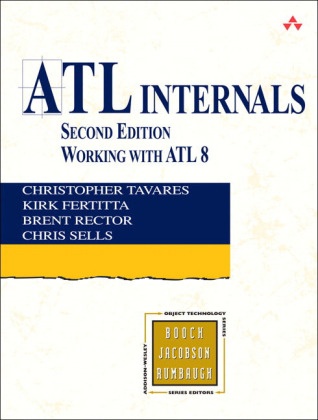Read more
The Classic Guide to ATL-Now Updated for ATL 8 and Visual Studio 2005
Four leading Windows programming experts systematically reveal ATL's inner workings, explaining not just how ATL works, but why it works the way it does. Client-side developers will master ATL's resources for windowing, COM control, MFC integration, web service proxy generation, and more. Server-side programmers will discover ATL's full COM server and object services, and its extensive support for high-throughput, high-concurrency web applications, and services. Every Windows developer will learn powerful ways to increase flexibility, reduce overhead, and maximize transparency and control.
- Discover ATL's internals through diagrams, example code, and internal ATL implementation code
- Walk through wizards that simplify ATL usage in common applications
- Master string handling in C++, COM, and ATL
- Leverage ATL smart types, including CComPtr, CComQIPtr, CComBSTR, and CComVariant
- Understand and choose the right options for implementing IUnknown
- Create glue code that exposes COM objects from COM servers
- Use canned interface implementations to support object persistence, COM
collections, enumerators, and connection points
- Build standalone applications and UI components with ATL window classes
and controls
- Use ATL Server to develop web applications that run on Microsoft IIS
List of contents
Foreword to the Second Edition xiii Foreword to the First Edition xv Preface xvii About the Authors xxiii Chapter 1 Hello, ATL 1 Chapter 2 Strings and Text 43 Chapter 3 ATL Smart Types 99 Chapter 4 Objects in ATL 175 Chapter 5 COM Servers 243 Chapter 6 Interface Maps 299 Chapter 7 Persistence in ATL 345 Chapter 8 Collections and Enumerators 381 Chapter 9 Connection Points 441 Chapter 10 Windowing 489 Chapter 11 ActiveX Controls 567 Chapter 12 Control Containment 631 Chapter 13 Hello, ATL Server: A Modern C Web Platform 699 Chapter 14 ATL Server Internals 739 Appendix A C Templates by Example 787 Appendix B ATL Header Files 799 Appendix C Moving to ATL 8 803 Appendix D Attributed ATL 815 Index 827
About the author
Chris Tavares is currently a software development engineer in the Microsoft patterns and practices group, where he strives to help developers learn the best way to develop on the Microsoft platform. He first touched a computer in third grade, doing hand-assembly of machine code on an Intel 8080 machine with 512 bytes (yes, bytes) of memory, a hex keypad, and 7 segment LCD display. He's been digging into computers and software ever since. Kirk Fertitta is CTO of Pacific MindWorks, a leading provider of tools and services for electronic test and measurement. With his team at Pacific MindWorks, Kirk works extensively on code generation technology and Visual Studio extensibility. He is also a .NET/C# instructor for Pluralsight. Brent Rector, president and founder of Wise Owl Consulting, is a noted speaker, consultant, and author, specializing in .NET, ASP.NET, XML, COM, and ATL. Chris Sells is a program manager for the Connected Systems Division. He's written several books, including Programming Windows Presentation Foundation, Windows Forms Programming in C#, and ATL Internals. In his free time, Chris hosts various conferences and makes a pest of himself on Microsoft internal product team discussion lists. More information about Chris, and his various projects, is available at http://www.sellsbrothers.com.
Summary
The Active Template Library (ATL) is a set of small, efficient, and flexible classes created by Microsoft that facilitate the creation of interoperable components for developing Windows applications. The latest version of ATL is version 8, released with Visual Studio 2005. While .NET has been getting all the attention recently, there is still a huge base of installed COM/ATL code. Many programmers are dealing with difficult issues adding new .NET code to that installed base. At the same time there are many instances where ATL is still the superior choice for new applications - applications that have to run fast and efficiently on Windows, where the CPU doesn't have the memory or bandwidth to run .NET. This book will be a godsend to developers in both of those situations. As one tech reviewer put it, "Any programmer needing to transition ATL code to .NET will need this book." The first edition was widely praised, and sold close to 20,000 units. While ATL is no longer the cutting edge of Microsoft developer tools, there should still be a strong market for authoritative, complete, deep coverage of the newest version of this standard tool.

